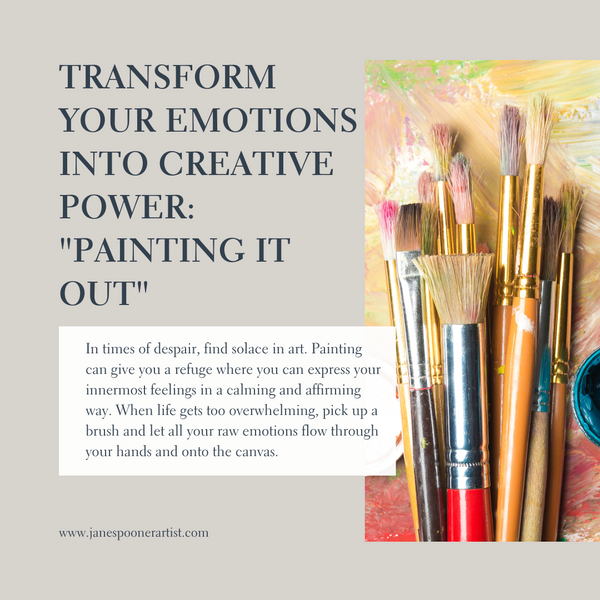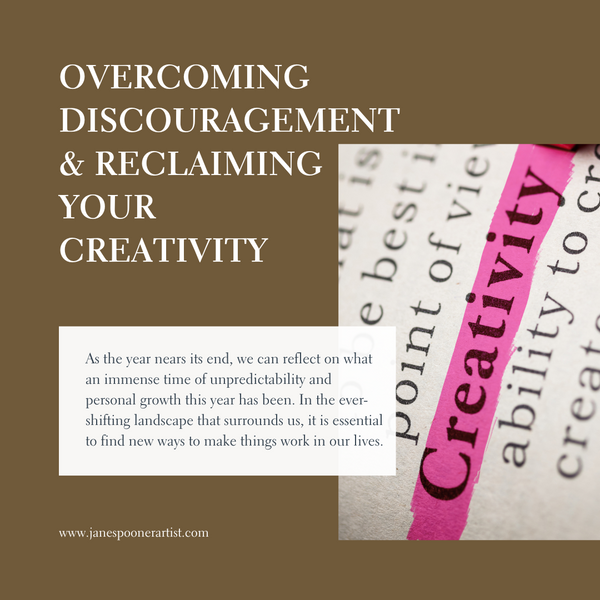
If you have ever felt a looming sense of anxiety for no specific reason, know that you are not alone. This feeling is so common among people in many professions, including creative careers where success often comes from subjective pieces. This sensation has even been given a name: Imposter Syndrome.
Imposter syndrome can present itself in many ways, such as social anxiety, feeling like you're going to fail no matter what, devaluing your worth and talent, and underestimating your expertise. Not only does this lack of confidence seriously affect how you see yourself, but it can also prevent you from taking risks that could help further your career or personal growth.
Imposter syndrome doesn't only make us feel like we do not deserve the compliments we receive, but it also tricks our minds into thinking that other people can see right through us. It's as if somebody more knowledgeable will come along and take away the title of "artist" that we claimed for ourselves--even though we're good enough. This type of mindset isn't unique to creative careers either; even the most successful CEOs, politicians, and entrepreneurs have all fallen prey to imposter syndrome at some point in their lives.
For creatives, the pressure can feel debilitating.

It's not easy being an artist. You create each piece with passion and then present it to a highly critical art world that operates based on completely subjective standards.
It gets worse the further you progress in your art career. Imposter syndrome will haunt you constantly. Did you sell that piece because you're good or because the buyer was feeling generous? Did you receive that artist grant because of your amazing work or simply due to timing?
If you don't manage your self-doubts, they will gradually erode your confidence until there's nothing left. Before imposter syndrome wreaks havoc on the success and future of your art practice, destroying your self-confidence in the process, you need to find a way to deal with it head-on. But where do you start?
Acknowledge your self-defeating thoughts and redirect

Did you know that it's possible to train your brain for better thinking? That there are definite, straightforward steps you can take to become more positive? It won't be simple. Forms like these have shown to be tough to break in the past. Especially when we're talking about mental habits that might not even be noticeable. Nevertheless, this should make us want to try harder!
Art is a journey, and every great artist had to start somewhere. To find your footing, begin by giving up any unhealthy habits that are holding you back. This could be anything from self-comparison and making excuses to perfectionism or the need for validation. These things will only serve to erode your confidence and squander your creative potential. Remember why you became an artist in the first place—that’s what counts!
Learn to take risks; it'll pay off in the long run.
We all feel fear. It's an emotion that urges us to stay clear of harm---like standing on the edge of a building or swimming in dangerous waters. And sometimes, fear does protect us from harm. But other times, fear can prevent us from chasing our dreams and growing our businesses.
Safety isn’t always the best place to be!
We use the fear of failure as an excuse to stay in our comfort zone because it's easier than admitting defeat in front of others--which imposter syndrome tells us is bound to happen.
But when you think about it, what is there to be scared of? What's the worst possible outcome?
Imposter syndrome can only be dealt with by understanding that failure isn't final. If things don't work out this time, it's not the end of everything. You'll learn from your mistakes and become stronger for them! Each failure adds more experience to your resume, making you better equipped to deal with future challenges.
There is always another opportunity for those who are willing to take risks. The more we practice taking risks, the less fearful we are of failure. Failure only occurs when we never try.
Start your own "I did that" box!
Society expects us to always perform perfectly, but by constantly striving for this unreachable goal, we lose sight of what brings us fulfilment. We forget our purpose.
You are in charge of your success as an artist and entrepreneur, so you have to celebrate your successes. Unlike traditional business settings, there's no one to congratulate you on a job well done or give you recognition. You won't get raises or promotions either. But that's okay! You're the boss after all.
Without outside validation, it's easy to start doubting your accomplishments and feel like an imposter in your field. The next time you have a professional success, big or small, take one minute to write it down. Include what the accomplishment was, how you felt about it, why it was successful, and any factors that may have led to the success.
As an artist, you'll have days where you feel uninspired or unmotivated. On these occasions, it helps to have a physical or virtual "I did that" box as a reminder of your successes to give yourself a morale boost. This can be anything accessible to remind yourself what a great artist you are, such as an online archive, folder on your computer, or even going old school and having an actual shoebox filled with print-outs. Keep these reminders close by so they're never hidden or forgotten!
If you find it difficult to trust yourself, try trusting others instead.
The next time you start to question your talent, think about this...
Do you believe that all the people who have helped you along the way did so because they felt sorry for you? That they saw no value in you or your work – but decided to invest their time and resources into you despite that?
The individuals who selected you for their shows, the teachers who gave you an A grade--the consultants and designers who assisted in selling your pieces: are all of these professionals incompetent? The people that got us to where we currently stand know what they're doing. To achieve success, talent and credibility are essential. Without both aspects, society would fall apart.
Be your own best friend.
Now think about this conversation that you have likely had before: A loved one is telling you how they feel down on themselves, doubting their abilities and self-worth.
What do you say? You quickly comfort them by letting them know that in your eyes, they are kind, smart, and hardworking—someone who always bounces back no matter what. There's no way you're leaving their side until they realise it too.
It's much simpler to be compassionate to others than it is to show compassion for ourselves even though we deserve it just as much. When you're feeling unsure of yourself, reach out to the people who love and know you best--those closest to your inner circle. They'll give it to you straight without sugarcoating anything because they want what's best for you. Listen carefully to their words and try to have as much faith in yourself as they do in
you. See yourself through their unbiased eyes, then slowly start treating yourself with the same respect and love that you would your dearest friend.
Become more confident in sharing your work with others.

Not only that, but we also have something called negativity bias. What this means is that as humans, we tend to focus more on negative feedback and remember it more vividly than positive comments—no matter how much good feedback we receive. “Your brain is just wired to pay greater attention to unpleasant news,” according to Psychology Today. And research has confirmed it!
The only way to sell your artwork is by making it highly public, so you're going to need to get over any social anxiety you have about putting your heart and soul into your work. Remember why you create art in the first place, and that will help motivate and encourage you.
If you knew that no one would ever see your work today, would you still make it? Would you paint or sculpt or draw if there was no possibility of showing your work to others?
Any good dating advice will tell you that you "have to love yourself first." The same is true of your work; if you don't enjoy what YOU are making, no one else will either. Also, it's vital to remember that when it comes to your art, you are the expert! No one knows more about it than you do.
You are the expert.

By teaching what you know to another artist, you can help shape the next generation of creatives.
By teaching a workshop, joining a Facebook group, or even just grabbing coffee with someone starting in their creative journey, you will quickly realise how much expertise and skill you have acquired over the years.
It's always good to receive a confidence boost, but it's also humbling to remember that nobody knows everything all the time. Not even the most successful artists alive started out knowing everything. We all had to start somewhere and there’s always more to learn, even when it appears that our mentors know everything.
Mentoring another artist allows us to give back to the community and provides some perspective. It allows us to share our creative spark with others while serving as a reminder that we are all at different points on our journeys - it's important just keep moving forward."
If you want to get rid of that pesky insecurity, make friends with the concept of lifelong learning, ditching your ego, and perfectionism. Trust that you're exactly where you need to be in this moment, knowing how far you’ve come already and keep the excitement alive for all the places yet to go.
Don't shy away from what makes your work unique - embrace it!

When we have unique experiences, it helps us to connect with others. Hearing different viewpoints usually encourages us to change for the better. And this is true whether we are talking about an art career or artwork itself. Because everyone has their journey and story to tell, there will always be someone who can gain knowledge from what you share. Even if you only manage to inspire one other person (or even yourself), isn't it still worth it in the end?
Don't allow imposter syndrome to make you feel less important.
Maintaining a positive mindset is key to success, and you should constantly strive to feed your mind with positivity. Take advantage of opportunities that will help build self-confidence, refrain from negative self-talk, and be grateful for the people and experiences in your life. Everyone deserves happiness and success—including YOU!
If you want to vanquish impostor syndrome, start by comprehending your one-of-a-kind voice and the motive behind your art.
We hope that by now you feel a bit more motivated to start creating art, regardless of whether or not anyone will ever see it. Remember that you are the expert on your work, and teaching other artists can help spread your creative spark. As long as you keep learning and growing, imposter syndrome won't be able to stand in your way!
Join me in spreading the word! I'm sharing this inspiring article on Pinterest and invite you to do the same. Let's make sure everyone has access to great ideas, insights and knowledge - our way of helping each other grow! Click the below image and help share these ideas now – let’s make sure no one misses out! ↓



